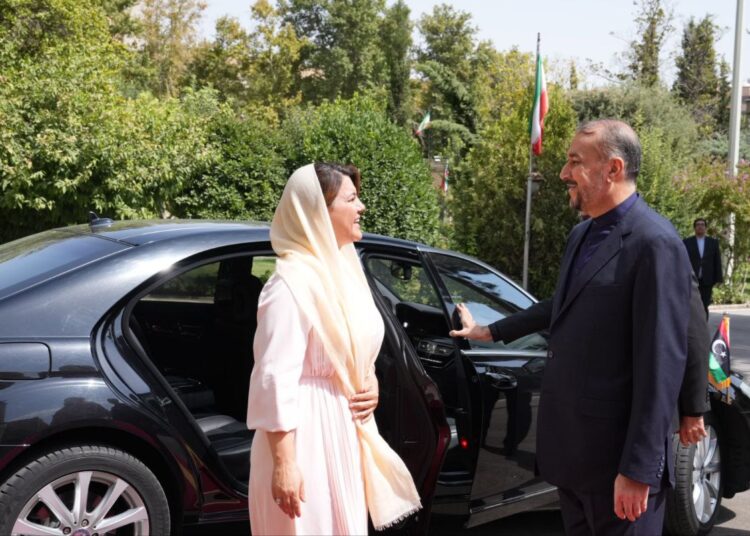In an unprecedented diplomatic stride, Libya’s Minister of Foreign Affairs and International Cooperation, Najla El Mangoush, was warmly received in Tehran. The invitation came from Iran’s Minister of Foreign Affairs, Hossein Amirabdollahian, marking a significant occasion as it denotes the earliest visit from a senior Libyan official to Tehran in a span of approximately 17 years.
The two ministers, Amirabdollahian and El Mangoush, had earlier engaged in a phone dialogue regarding the progression of bilateral ties and the shifts in regional and international landscapes. This telephone conversation took place on March 26, during which, they touched upon the prominent issues like the reopening of the Iranian embassy in Libya and the appointment of the Iranian ambassador to Tripoli.
Libya, reciprocating the gesture, declared the escalation of its diplomatic presence in Tehran from the chargé d’affaires to ambassadorial level accompanied by the nomination of its ambassador to Iran. This occurred in unison with the arrival of an Iranian diplomatic delegation in Tripoli leading to the reopening of the Iranian embassy there.
During the turbulent phase of Libyan civil war the diplomatic relations between Iran and Libya experienced a brief and partial hiatus. Iran, whilst expressing apprehension at NATO’s military involvement, expressed support for the revolutionaries during the Libyan people’s revolt in 2011.
In light of the Libyan revolution’s triumph, Ali Akbar Salehi, the then Iranian Foreign Minister, extended his warm wishes to Mustafa Abdul Jalil, the Chief of the Libyan National Transitional Council, in a phone conversation. Consequently, Salehi paid a visit to Libya in November 2011. One of the issues on the agenda of this visit revolved around Salehi’s appeal to the revolutionary government to follow up on the status of the distinguished Shia leader Imam Musa Sadr and his comrades. Reports last placed Imam Musa Sadr in the Abu Salim prison in Tripoli circa 1997.
Nasser Kanaani, Iran’s Foreign Ministry spokesperson, said the next Iranian Ambassador to Libya has already been nominated. Rauf Sheibani has so far held the position of Iranian Ambassador to Tunisia as well as the ambassador accredited in Libya. In an interaction on March 12, 2023, matters pertaining to the enhancement of bilateral relations, activation of the Libya-Iran joint economic committee, and measures to recommence the operations of the Iranian embassy in Tripoli were discussed between Sheibani and Libyan Foreign Minister.
At the inception of his diplomatic mission in Iran, Ali Juma Hassan Fazil, Libya’s newly appointed Ambassador to Tehran, convened with Hossein Amirabdollahian, Iran’s Foreign Minister. Thereafter, he offered his credentials to the President of Iran on July 9, 2023.
In light of these renewed ties, Iran’s shipping company in Libya has also revived its operations. Indeed, just last month the maiden Iranian vessel docked in the port of Misrata after a lull of nearly a decade.
The prospects of Iran and Libya cultivating more comprehensive cooperation across diverse sectors presents itself. The energy sector and a unified stance on regional and global policies could prove to be the cornerstone of this newfound cooperativity. The rehabilitation and magnification of Libya’s infrastructure could potentially offer a lucrative investment opportunity and export for Iranian technical expertise. The export of Iranian-manufactured goods to the Libyan market, contingent upon price and quality, proffers yet another area for commercial alignment between Tehran and Tripoli.
In the political arena, the integration of Iran and Libya within shared organizations, notably the Organization of the Islamic Conference, is assessed as another convergence point between Tehran and Tripoli.






